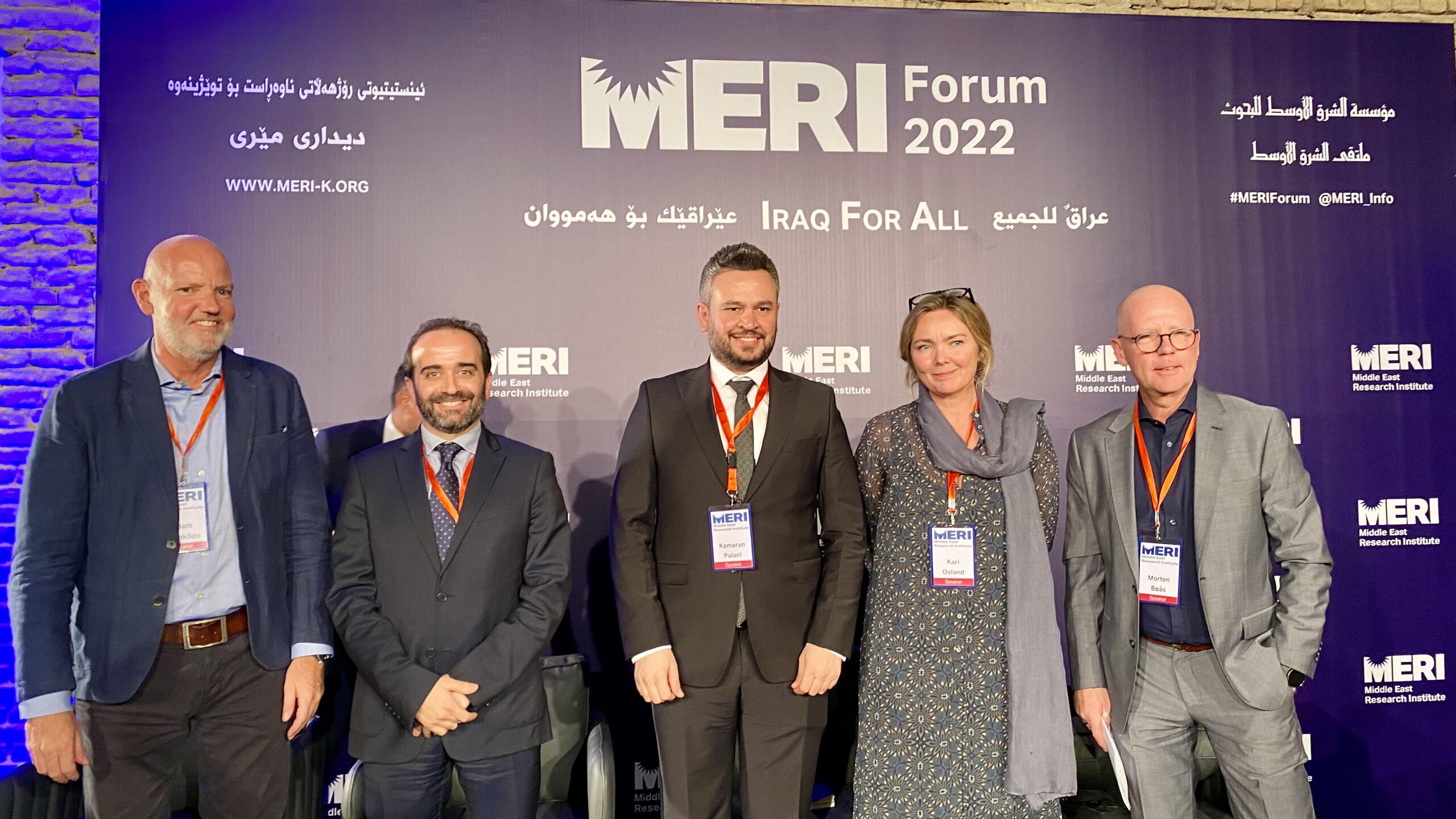Iraq is an enabling environment, but most people are not radicalised. Why?
On 31 October – 2 November 2022, the MERI Forum 2022 was held in Erbil, Iraq. PREVEX kick-started the forum with the panel Prevention of Violent Extremism in the Middle East, addressing the issue of violent extremist mobilisation in the region, how it can be prevented, and lessons for the European Union. PREVEX was represented by Senior Researcher Kari Osland (Norwegian Institute of International Affairs) and Kamaran Palani (Middle East Research Institute), accompanied by Amjed Rasheed (Open Think Tank) and Adam Ravnkilde (EU Advisory Mission in Iraq). The panel was moderated by PREVEX Principal Investigator Morten Bøås (NUPI). A video recording of the event can be found below.
Morten Bøås opened the panel with a few words about Iraq’s recent history as the frontier in the struggle against Daesh. While Daesh has been defeated, we must take stock of what has happened and better understand how violent extremism can be prevented. We need to acknowledge the blind zone that has been created because of the emphasis on the very manifestation of violent extremism. This has gone at the expense of the immense levels of resilience among communities that have prevented violent extremism from taking a grip on even larger numbers of people. Based on the PREVEX project’s research findings, Bøås pointed to three factors that must be present for a society to resist violent extremism. First, a long and unbroken tradition of religious toleration and moderation must exist. Secondly, this tradition must be supported and facilitated by leaders who are perceived as legitimate and relatively uncorrupt in their behaviour towards the local community. Lastly, people must see these local leaders as someone who provides something useful to their communities.

Drawing on PREVEX research from the Balkans and the Sahel, Kari Osland highlighted six factors that are found to be important for community resilience across regions: a long tradition of secular Islam, moderate religious leaders with a high degree of legitimacy, employment and educational opportunities, high levels of social cohesion, geographical and social opportunities for mobility, and a certain degree of ethnonationalism that may function as a binding force. Otherwise, ethnonationalism constitutes a considerable challenge, particularly in the Balkans, and plays more of a dividing role. Osland emphasised the importance of taking into account that community resilience is context-specific and that what promotes radicalisation and resistance to radicalisation are often two sides of the same coin.
Based on PREVEX research conducted in the Middle East and a recently published MERI report, Kamaran Palani stressed the need to change the narrative of violent extremism in the Middle East. While the existing knowledge highlights poor governance and socio-economic conditions, the focus of the governments in the Middle East region is still on religion or external interventions. We are at a moment where we need to use all the research evidence to influence policymakers to tackle governance issues, Palani argued, whether it is the question of legitimacy, participation, representation, or socio-economic opportunities. Six years after the defeat of ISIS, most socio-economic grievances still exist in the country. Therefore, we need to change the research direction and how politicians and policymakers define violent extremism’s root causes and drivers.

In the case of Iraq, Ajmed Rasheed from Open Think Tank (Iraq) recommended taking a step back to find the root causes of violence. Analysing Iraq’s political developments before and after 2005, Rasheed argued that violent extremism in the country is solely driven by the structure of the political system as established in 2005. The consociational political system relocated power to the people, but it did not relocate the meaning of the power. Thus, there is a need to restore the power of the Iraqi state, which is the only institution society sees as a credible force of resistance against violent extremism.
Bringing in a European perspective, Adam Ravnkilde from the EU Advisory Mission in Iraq emphasised that Europe, and the West in general, is forced to re-think its stance towards violent extremism as a result of the threats Europe is currently facing related to rising political extremism and right-wing terrorism. The right-wing threat is an eye-opener because it forces Europe to look to its own societies and communities, Ravnkilde argued. Another point made was that to reduce the enabling environment for violent extremism, we can become better at promoting more knowledge-based policy formulations and more knowledge-based distribution of resources. If implementing a national or local CVE/PVE action plan, for example, it is important to focus the resources in the right direction as the plan develops.



